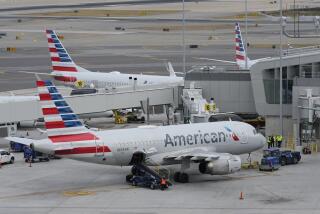Airlines add $3 fee for passengers between U.S. and Europe
It looks like the new European plan to limit airline emissions will cost U.S. travelers to Europe a few bucks.
The plan to impose strict emission limits on planes flying in and out of Europe took effect Jan. 1, and Delta, United, American airlines and US Airways have already added a $3 surcharge for flights between the U.S. and Europe. It is a move that industry analysts see as a way to offset the emission plan’s financial impact on the airlines.
But that is only part of the fallout from the new emission plan.
A trade group for Chinese airlines has threatened to withhold emission data from European officials in protest of the plan. Chinese government officials, however, said they would be wiling to discuss a resolution with the Europeans.
The European Commission, the executive body of the European Union, launched the emission plan in 2005, first targeting utilities and manufacturers and recently adding airlines. Starting Jan. 1, greenhouse gas emissions from airlines are capped at 97% of their average level in 2004 to 2006 and capped at 95% in 2013.
The emissions are calculated by the distance planes fly in and out of Europe and their payload. Airlines that don’t use all their emission allowances can sell the excess to those carriers that exceed the limits. The cost for violating the plan is 100 euros, or about $142, for every ton of greenhouse gases that airlines emit above the limit.
A trade group for U.S. airlines, which challenged the plan in court, estimated that it will cost the nation’s airlines $3.1 billion through 2020.
Representatives for the airlines that added the $3 surcharges said federal pricing rules prohibit them from discussing the reason behind the new charge. But industry analysts say the charge is clearly designed to offset the emission plan.
Environmental groups that support the emissions plan say airlines can avoid paying any emission taxes by flying more efficient planes or buying allowances from other airlines. “The plan has lots of wiggle room,” said Annie Petsonk, international counsel for the Environmental Defense Fund in New York.
She also wondered why airlines have already started to collect surcharges on flights to Europe without knowing how much they will pay in emission taxes. Petsonk also said that “$3 per ticket is lost in the noise of all the other charges they have.”
L.A. makes top 10 list of destinations on Orbitz
New York; Las Vegas; Orlando, Fla.; Chicago and Los Angeles topped the list of most popular travel destinations in 2011, according to booking data and online searches reviewed by the travel website Orbitz.
But what was surprising about the top 10 list was the absence of coastal vacation spots such as San Diego, Honolulu and Miami. All three beach destinations, as well as New Orleans, made the top 10 list in 2010 but were bumped off in 2011 by Boston, Los Angeles, Denver and Atlanta.
Orbitz analyzed search inquiries and found that the most popular perks sought by travelers booking hotel rooms in 2011 were convenient transportation, pools and extras such as spa services, fitness centers and wireless Internet.
For the third consecutive year, Christmas week (Dec. 19 to Dec. 25) was the busiest travel week of the year, followed by the week leading up to the Fourth of July and Thanksgiving week (Nov. 21 to Nov. 27).
And based on booking data, Orbitz predicts the hot travel destinations for 2012 will be London, which will host the summer Olympics; Austin, Texas, which will host the U.S. Formula 1 Grand Prix in November; and Chicago, which will host the World Summit of Nobel Peace Laureates in April, followed by the G8 Summit in May.
AirTran to pull the plug on satellite radio
In 2005, AirTran Airways became the first U.S. airline to offer passengers satellite radio among the in-flight entertainment options.
But the XM satellite radio is about to be pulled out of AirTran planes as the airline gets swallowed up by its new parent company, Southwest Airlines, which acquired AirTran in May.
“The decision to remove XM satellite radio from the AirTran fleet was not taken lightly, and it’s another step in the integration of offering a consistent product between Southwest and AirTran,” said Katie McDonald, a Southwest spokeswoman.
Customer research has found that most passengers prefer to listen to music and entertainment on their own media devices, she said.
“With the cost of fuel at all-time highs,” McDonald said, “losing the weight of the XM equipment will help reduce our fuel costs.”
More to Read
Inside the business of entertainment
The Wide Shot brings you news, analysis and insights on everything from streaming wars to production — and what it all means for the future.
You may occasionally receive promotional content from the Los Angeles Times.






